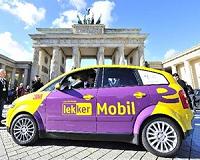 |
Lund, Sweden (SPX) Feb 09, 2011 Every time a car brakes, energy is generated. At present this energy is not used, but new research shows that it is perfectly possible to save it for later use in the form of compressed air. It can then provide extra power to the engine when the car is started and save fuel by avoiding idle operation when the car is at a standstill. Air hybrids, or pneumatic hybrids as they are also known, are not yet in production. Nonetheless, electric cars and electric hybrid cars already make use of the brake energy, to power a generator that charges the batteries. However, according to Per Tunestal, a researcher in Combustion Engines at Lund University in Sweden, air hybrids would be much cheaper to manufacture. The step to commercialisation does not have to be a large one. "The technology is fully realistic. I was recently contacted by a vehicle manufacturer in India which wanted to start making air hybrids", he says. The technology is particularly attractive for jerky and slow driving, for example for buses in urban traffic. "My simulations show that buses in cities could reduce their fuel consumption by 60 per cent", says Sasa Trajkovic, a doctoral student in Combustion Engines at Lund University who recently defended a thesis on the subject. Sasa Trajkovic also calculated that 48 per cent of the brake energy, which is compressed and saved in a small air tank connected to the engine, could be reused later. This means that the degree of reuse for air hybrids could match that of today's electric hybrids. The engine does not require any expensive materials and is therefore cheap to manufacture. What is more, it takes up much less space than an electric hybrid engine. The method works with petrol, natural gas and diesel. For this research the Lund researchers have worked with the Swedish company Cargine, which supplies valve control systems. The idea of air hybrids was initially hit upon by Ford in the 1990s, but the American car company quickly shelved the plans because it lacked the necessary technology to move forward with the project. today, research on air hybrids is conducted at ETH in Switzerland, Orleans in France and Lund University in Sweden. One company that intends to invest in engines with air hybrid technology is the American Scuderi. However, their only results so far have been from simulations, not from experiments. "This is the first time anyone has done experiments in an actual engine. The research so far has only been theoretical. In addition, we have used data that means we get credible driving cycle results, for example data from the driving patterns of buses in New York", says Sasa Trajkovic. The researchers in Lund hope that the next step will be to convert their research results from a single cylinder to a complete, multi-cylinder engine. They would thus be able to move the concept one step closer to a real vehicle.
Share This Article With Planet Earth
Related Links Lund University Car Technology at SpaceMart.com
 World record e-car burns amid controversy
World record e-car burns amid controversyBerlin (UPI) Feb 8, 2011 Shortly before Christmas, a world record-setting electric car developed by small German start-up DBM Energy burned. Authorities are investigating and conspiracy theorists have since accused established car-making giants, which were embarrassed by the record, as responsible for the fire. The story started in October, when Mirko Hannemann, the 27-year-old founder of DBM Energy, drove his ... read more |
|
| The content herein, unless otherwise known to be public domain, are Copyright 1995-2010 - SpaceDaily. AFP and UPI Wire Stories are copyright Agence France-Presse and United Press International. ESA Portal Reports are copyright European Space Agency. All NASA sourced material is public domain. Additional copyrights may apply in whole or part to other bona fide parties. Advertising does not imply endorsement,agreement or approval of any opinions, statements or information provided by SpaceDaily on any Web page published or hosted by SpaceDaily. Privacy Statement |